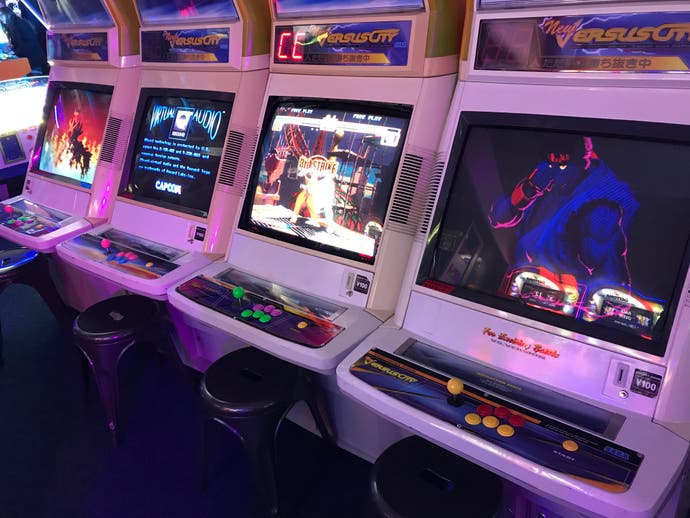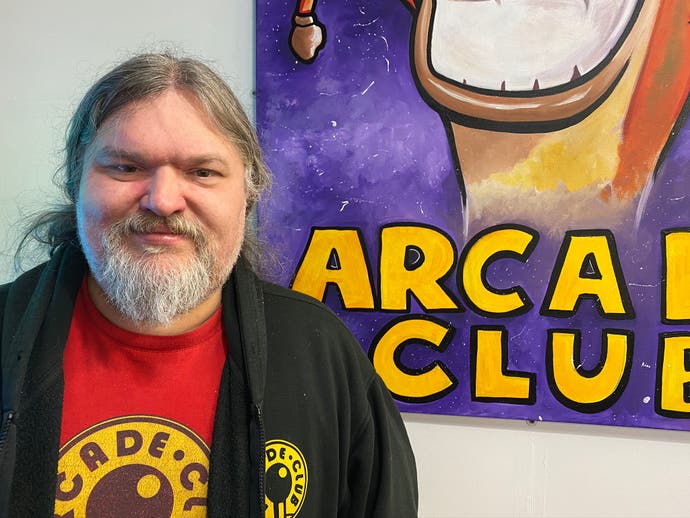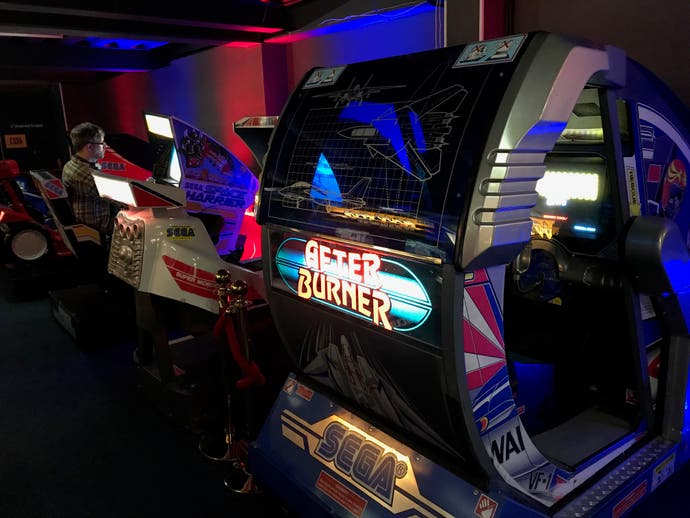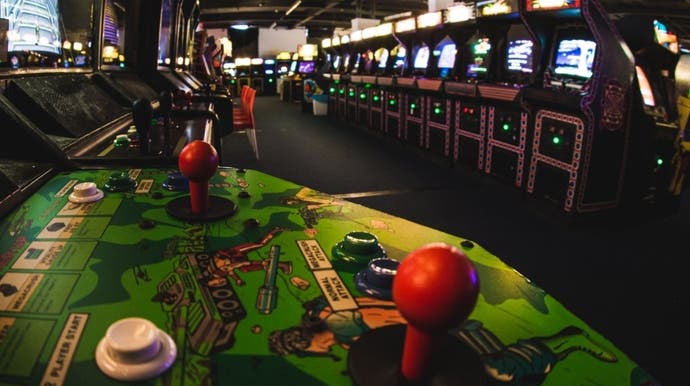Meet the man behind the astonishingly successful Arcade Club
If you build it, they will combo.
Andy Palmer, the man behind Arcade Club, is having the time of his life. He feels like he has been given a second chance, a chance to do something he absolutely loves, day in, day out. "It keeps me alive," he says of the arcade chain he started in 2015 with its mix of beloved retro machines and cutting-edge games. "It's actually given me a reason to live again. Because I'm 48 this year, which is tragically near 50, and when you get to your forties and you think you've not done as much in your life as you would like to, or you think you should have done, everyone starts getting a bit cynical and a bit down. So this has really given me a shot in the arm in a big, big way."
Andy previously ran a chain of four computer-repair shops in the Rossendale Valley in Lancashire. But around 2013, business had slowed dramatically, partly because people were ditching their computers for tablets and smartphones. "All you tended to get were people in their 50s, 60s and 70s bringing the same old Vista machines back," he says. "It just turned into a reinstall of Windows every single day."
The dwindling business caused Andy to question what he was doing with his life. "You do start to feel like, 'what's next?'," he says. "You've only got so many options when you hit your forties." And that was the point when he hit on the idea of putting some of his beloved arcade machines in the shop for people to play.
Andy has been collecting arcade PCB boards since the early 1990s, when he realised that for the same price as a Mega Drive cartridge, he could buy arcade gems like Strider, R-Type and Ghouls and Ghosts and play them on his TV using the SuperGun converter, "which is basically just RGB and power which [plugs into] the scart socket on your TV," he says. Later he started collecting the cabinets themselves, and by 2013 his home and the cellars beneath his shops were rammed full of classic arcade and pinball machines.

He experimented at first by shoving 20 cabinets and 10 pinball machines at the back of one of the shops, putting them all on free play, and charging customers £10 for four hours. It proved hugely popular, so a few months later in 2015 he expanded, setting up 100 machines in a large warehouse in Haslingden. "It worked incredibly well," he says.
But the real boom came when the BBC featured the nascent Arcade Club on an episode of the TV show Collectaholics. "That helped us immensely," says Andy. "It was massive. They went through and valued the machines, and it was over £300,000, which was quite surprising at the time! Once Collectaholics aired, it went through the roof, and people tracked us down. It got daft, the parking was ridiculous - neighbours were complaining like crazy. We were getting 100 people arrive, with 50, 60, 80 cars, and it was just getting stupid. So I threw caution to the wind basically, I said we're gonna have to move somewhere." Andy contacted estate agents, who found him the top floor of a disused mill in Bury, just outside Manchester, which had previously been used as a gym. "When we moved here, we had no money," says Andy. "I actually sold an Out Run Deluxe to get the deposit together. It was a bit of a punt. And many of my friends and colleagues said it wouldn't work, you're going to end up with a very expensive failure on your hands. People will come for a couple of weeks, a month or whatever, and then it'll tail off. But I believed in it. I thought the worst that could happen if it fails was that I'd have to sell some machines to repay any loans, and I'd just find something else to do. But luckily it did work, in a very, very big way."
While we're talking, Andy's phone is constantly vibrating with calls and messages. He ignores it for the most part, apologising, but asks to stop and take one seemingly urgent call after the same person rings four times in a row. "It's like this all day, every day," he laments, but with a smile. Arcade Club clearly means everything to him. "I answer all the phone calls for both venues, 24/7. I answer the phone, I do all do all the social media as well for Arcade Club. I'm a micromanager, basically. I think one of the reasons Arcade Club works is because I put my heart and soul into it seven days a week, 24 hours a day. I mean I'm up 'til one o'clock in the morning, seven days a week, from when I get up around eight, nine o'clock. Because that's what it takes. It's very important that that phone gets answered and people get dealt with."

Since 2015, the Bury site has gradually expanded to fill three huge floors, and Andy says the venue is packed to its 600-person capacity every weekend. The colourful, sofa-strewn, open-plan layout is a world away from the seedy arcades of the 1980s, and the mix of classic and cutting-edge games attracts people of all ages - something that Andy was surprised by at first. "When Arcade Club first started, I honestly thought it would be pretty much only 30, 40, 50-somethings, with the odd kid," he says. "We found out that families love the place, so we've catered for that and we've redesigned Arcade Club over the years."
Accordingly, the top floor is full of classic arcade games like Pac-Man and Defender, along with an impressive line of pinball tables like The Addams Family and Revenge From Mars. Then floor two is dedicated to more modern arcade games, including dance machines and oddball Japanese titles like Capcom's bizarre Monster Hunter Diary: Puri Puri Poogie Race, where players jiggle a pig-shaped controller to speed their Poogie around a track. Meanwhile, the newly opened floor one is more focused on younger players, and features a phalanx of huge TV screens hooked up to modern consoles, which Andy uses to host tournaments on games like Fortnite and FIFA. There's also a VR room and arcade staples like air hockey and basketball games, which he says are some of the most popular attractions.
Everything is free to play, all covered by a £16 entry charge, and the venue offers a bar and food, too. There's also the option of a £40 monthly pass that covers both the Bury site and the three-floor Arcade Club in Leeds, which opened in 2019. And Andy is currently preparing the venue for a third Arcade Club in Blackpool. "Everyone's pining for classic games in Blackpool," says Andy, "but none of the arcades are catering for it - they're all going for ticket redemption."
Indeed, he has few kind things to say about arcades that work on a ticket-redemption model, where machines spew out tickets that can be exchanged for prizes. "My personal opinion is I don't like it, because it's teaching a young generation to gamble. There's no ticket redemption in Arcade Club, there never will be. I'm massively against it." He also points out that Arcade Club doesn't have any coin pushers or claw machines.
Instead, Andy sees reinvestment as the secret to Arcade Club's continued success. "We buy machines all the time," he says, with the venues adding new cabinets every couple of weeks at least. "Everything goes back in. I don't take a wage, I just love doing it. To me, it's the best job in the world." Arcade games don't come cheap, however. Andy notes that they just bought a House of the Dead 5 cabinet for £25,000, and that the price of classic arcade games has skyrocketed over the past few years. "We'd buy a Defender for two or three hundred quid off eBay maybe five years ago as complete but non-working. The same machine now is approaching a grand. It's quite scary how they've increased in price over the years."
One way that Arcade Club keeps costs down is by fixing most things in house. Andy has several technicians, as well as help from volunteers "who just love repairing things", and the back room is an Aladdin's cave of oscilloscopes, soldering irons and boxes upon boxes of spare parts. When I visit, a 1980s Star Wars cabinet is in the process of having its innards removed and checked over.

Andy is thrilled with the success of Arcade Club over the past five years. "We're competing with the big boys, very established arcades that have been around for 20, 30 years, and frankly, we're knocking it out of the park." As such he's excited about expanding beyond Bury, Leeds and Blackpool, grinning as he declares his goal to "make Britain the arcade capital of the world". Still, he's also keen to avoid expanding too fast, which is why he has no plans to open an arcade in London in the near future. "The problem with jumping to London is logistics and the maintenance," he says. "We'd have to do a Birmingham hub first. I think there's more chance of us opening in the Midlands before London, because it's a hell of a drive ... so changing machines becomes a real problem. If we can half that by going for the Midlands, then that's much more sensible, and we can have some sort of logistical hub in the Midlands which can then share machines between all venues." He also says he's unlikely to open a venue in Scotland, but suggests that Newcastle might be an option.
One thing that could put a spanner in the works is the alarming rise of COVID-19. I spoke to Andy in Bury in early February 2020 for this feature, but I followed up with him by e-mail on to see how the pandemic has affected his plans. He said: "At this point we're doing all we can, as directed by government guidelines to help stem the spread of the virus. However, like most businesses in the UK, we're having to shift our strategy in terms of growth, which unfortunately means we'll be postponing the opening of our Blackpool venue until the full ramifications of the situation become more clear." Arcade Club re-opened on July 30th, where it's been running limited capacity sessions.
Here's hoping that Arcade Club continues its success in spite of the problems caused by the ongoing health crisis. It's a wonderful example of how the arcade can evolve to stay relevant in modern times, by celebrating nostalgia at the same time as welcoming the new. And a great part of its success is no doubt down to Andy Palmer's tireless passion for a project that means the world to him. "It's the best thing I'll ever do in my life, so I want to make a good job of it," he says. "It's my reason for living. Because when I eventually snuff it, I want to look back and go, was there a good reason for you being on planet Earth? Your 1 in 400 trillion chance of existing, was it worthwhile? Did you actually put something back? And I feel I'm putting a lot back here, and so is everybody else who works for us, because you're making people happy, and that's the best job in the world. You're making people smile."
You can find out more about Arcade Club at its official site.

